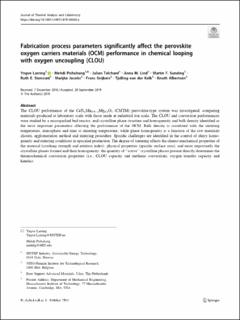Fabrication process parameters significantly affect the perovskite oxygen carriers materials (OCM) performance in chemical looping with oxygen uncoupling (CLOU)
Larring, Yngve; Pishahang, Mehdi; Tolchard, Julian R; Lind, Anna Maria; Sunding, Martin Fleissner; Stensrød, Ruth Elisabeth; Jacobs, Marijke; Snijkers, Frans; van der Kolk, Tjalling; Albertsen, Knuth
Peer reviewed, Journal article
Published version
Permanent lenke
https://hdl.handle.net/11250/2688041Utgivelsesdato
2019Metadata
Vis full innførselSamlinger
- Publikasjoner fra CRIStin - SINTEF AS [5802]
- SINTEF Industri [1566]
Originalversjon
Journal of thermal analysis and calorimetry (Print). 2019, 1-13. 10.1007/s10973-019-08860-ySammendrag
The CLOU performance of the CaTixMn0.9−xMg0.1O3 (CMTM) perovskite-type system was investigated, comparing materials produced at laboratory scale with those made at industrial ton scale. The CLOU and conversion performances were studied by a micropacked bed reactor, and crystalline phase structure and homogeneity and bulk density identified as the most important parameters affecting the performance of the OCM. Bulk density is correlated with the sintering temperature, atmosphere and time at sintering temperature, while phase homogeneity is a function of the raw materials chosen, agglomeration method and sintering procedure. Specific challenges are identified in the control of slurry homogeneity and sintering conditions in upscaled production. The degree of sintering affects the chemo-mechanical properties of the material (crushing strength and attrition index), physical properties (specific surface area), and more importantly the crystalline phases formed and their homogeneity: the quantity of “active” crystalline phases present directly determines the thermochemical conversion properties (i.e., CLOU capacity and methane conversion), oxygen transfer capacity and kinetics.

